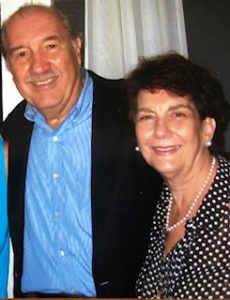![]()
Lydia Dibos remembers going to the Esperanza Center – then known as the Hispanic Apostolate – on occasional Saturday mornings as a teenager. Her mother, a pediatrician, had organized weekly clinics to serve children with no other access to health care.
Over the following decades, her physician parents, Esther and Pablo Dibos, continued their unwavering volunteer service at the clinic, supporting its growth as they treated immigrant patients who did not qualify for insurance and could not pay out of pocket.
Following her parents’ passing – Esther in 2014 and Pablo in 2019– Lydia Dibos and her brother Paul extended the family legacy at Esperanza with a donation that allowed the clinic to implement its first electronic health record system. On Sept. 10, Esperanza began using Epic, a system adopted by many area health systems.

Esther Edery Dibos and Pablo E. Dibos, both physicians, were instrumental at the Esperanza Center clinic.
“[We] really felt strongly after my dad died that we wanted to be able to continue supporting the clinic with a gift in memory of both my mom and dad,” Lydia said. “And here was an opportunity in the middle of the COVID-19 pandemic to get this going.
“My parents were people who never brought any attention to themselves. There are no buildings named after my parents. But they helped lots of people in their own way.”
A priority for the clinic
The shift to EHRs has long been a top priority for Katie Phillips, Esperanza’s clinic manager.
“This has been a labor of love for three years for me. I really believed that Epic was the best thing for our patients,” she said. “It was thanks to the Dibos family that we were able to pull it off.”
The rest of Catholic Charities shifted to a different EHR earlier this year, but Phillips said it wasn’t a good fit for Esperanza. Because the clinic doesn’t bill for the care it provides, it did not need the billing component of that system. In addition, to ensure continuity of care among providers, Phillips wanted the EHR to align with the Epic system used by Johns Hopkins, where many of Esperanza’s patients also receive medical care.
Two recent events underscored the importance of an online system. Following the 2018 fire that signficantly damaged the center’s Fells Point facility, the program undertook a massive effort to salvage and restore paper medical records. More recently, when COVID-19 necessitated a shift to virtual visits and telemedicine, clinicians struggled to reconstruct patients’ medical histories because paper charts could not be taken off-site.
“That really drove home the importance of getting this sensitive data onto the cloud and out of paper records,” Phillips said.
But, even with a subsidy that Johns Hopkins offers some community partners to support the transition to Epic, Phillips said Esperanza could not cover the set-up costs for the EHR – until the Dibos family’s contribution.
Lydia Dibos said she and her brother were interested in “helping a community that is still quite invisible here in Baltimore City.”
“I always look at my mom and dad as Good Samaritans,” she said. “If we encounter people who are suffering, we need to stop and help instead of looking away. I think that my mom and dad didn’t look away.”
